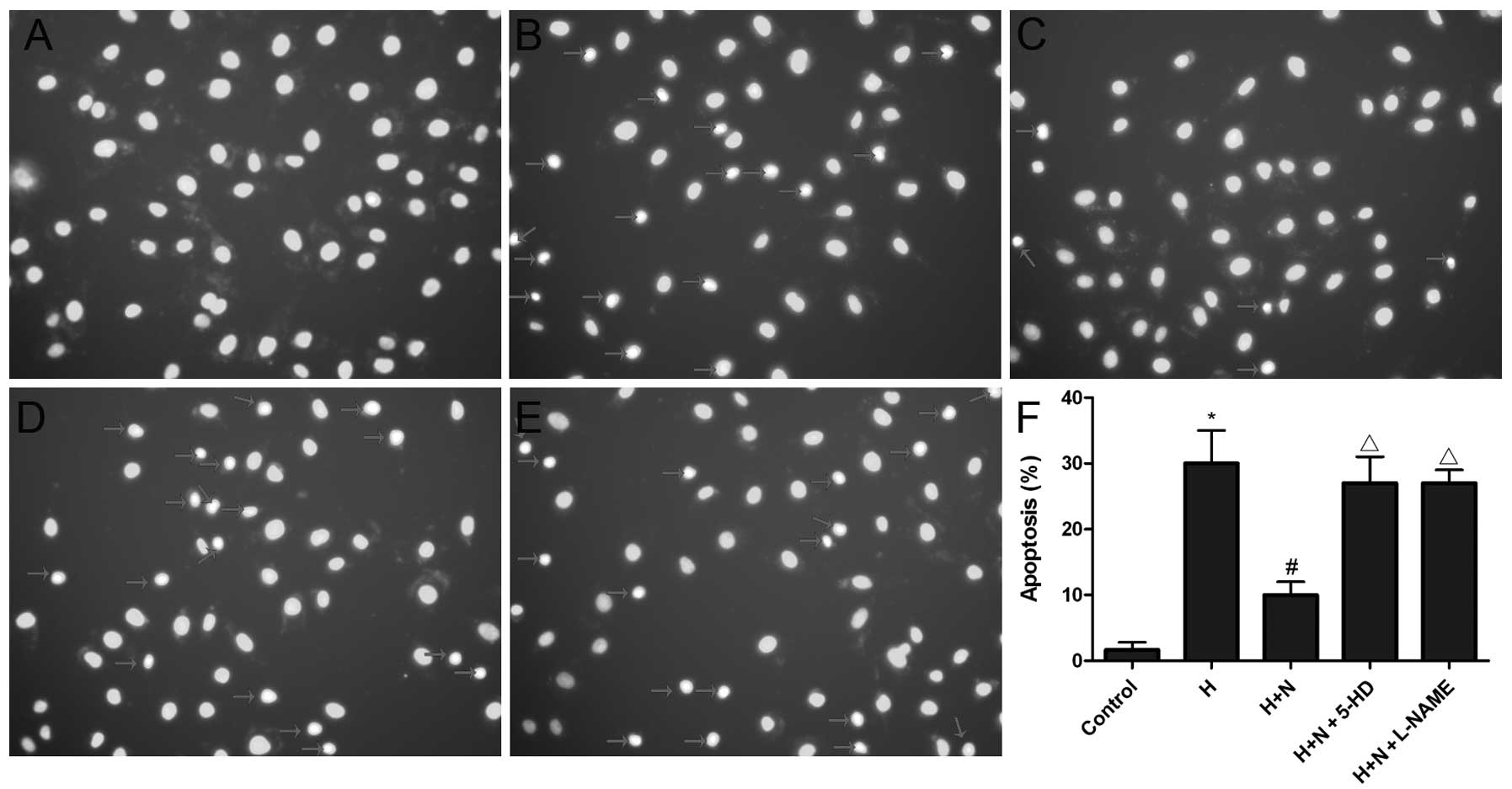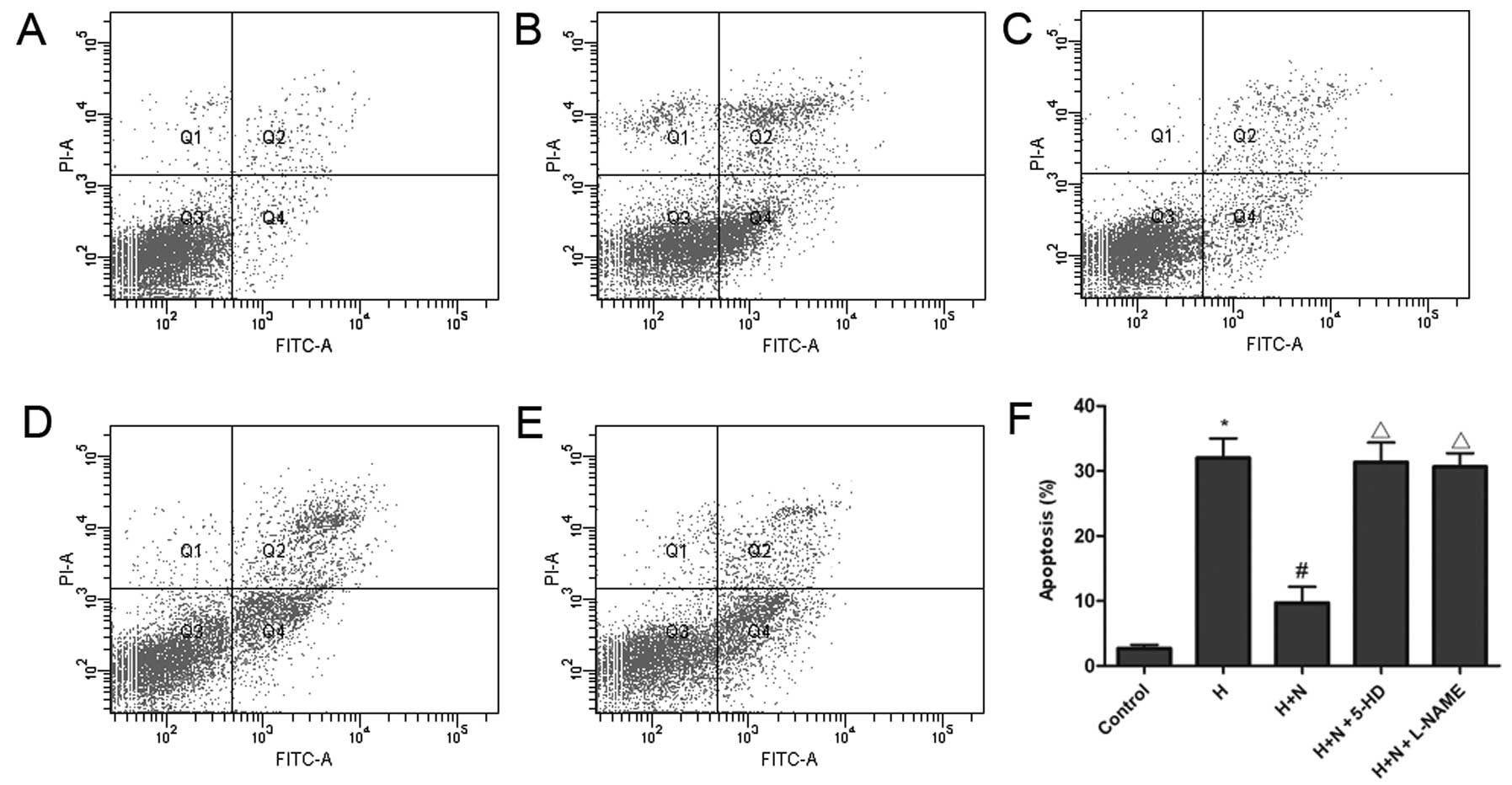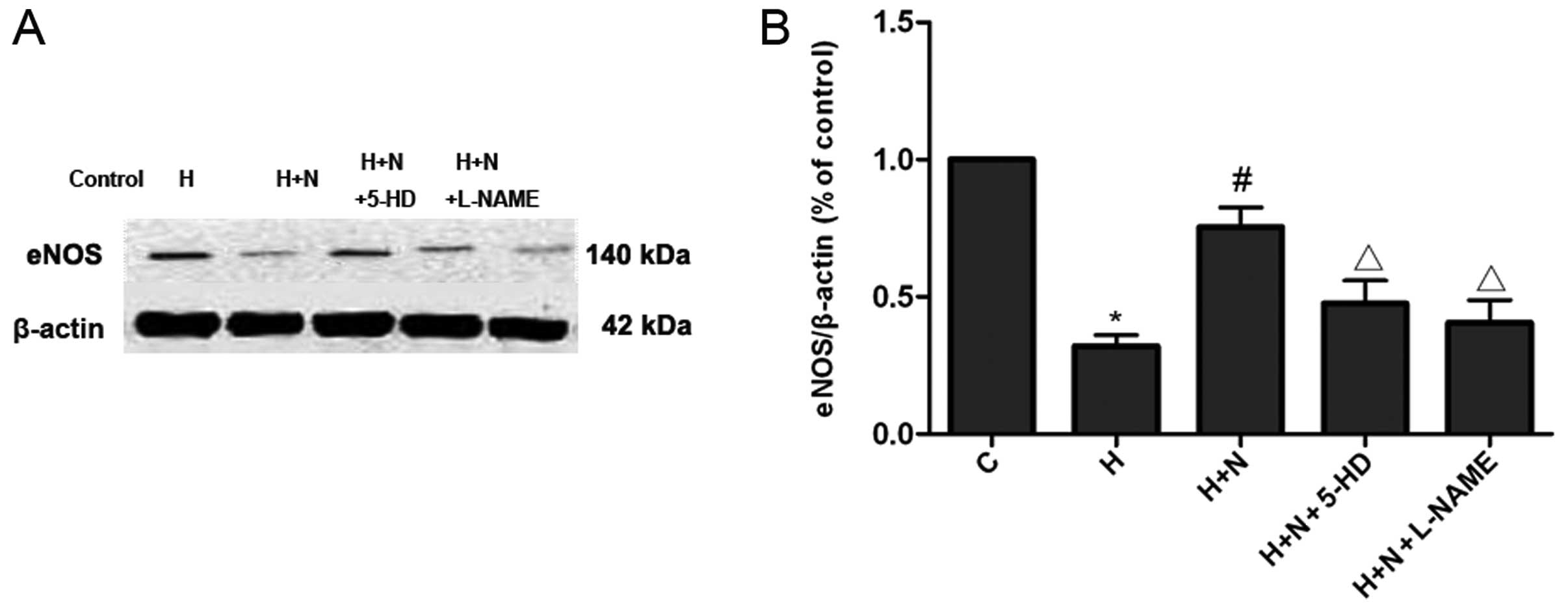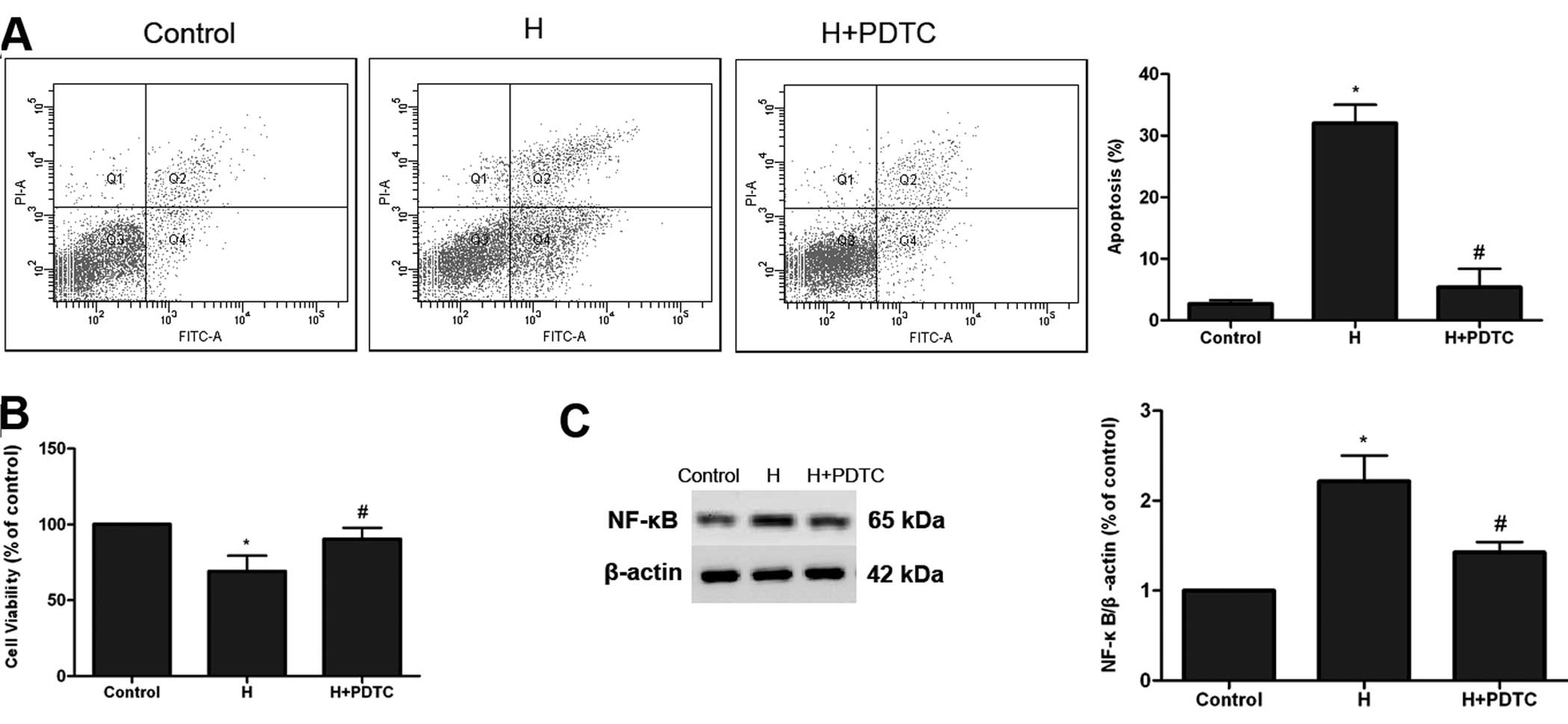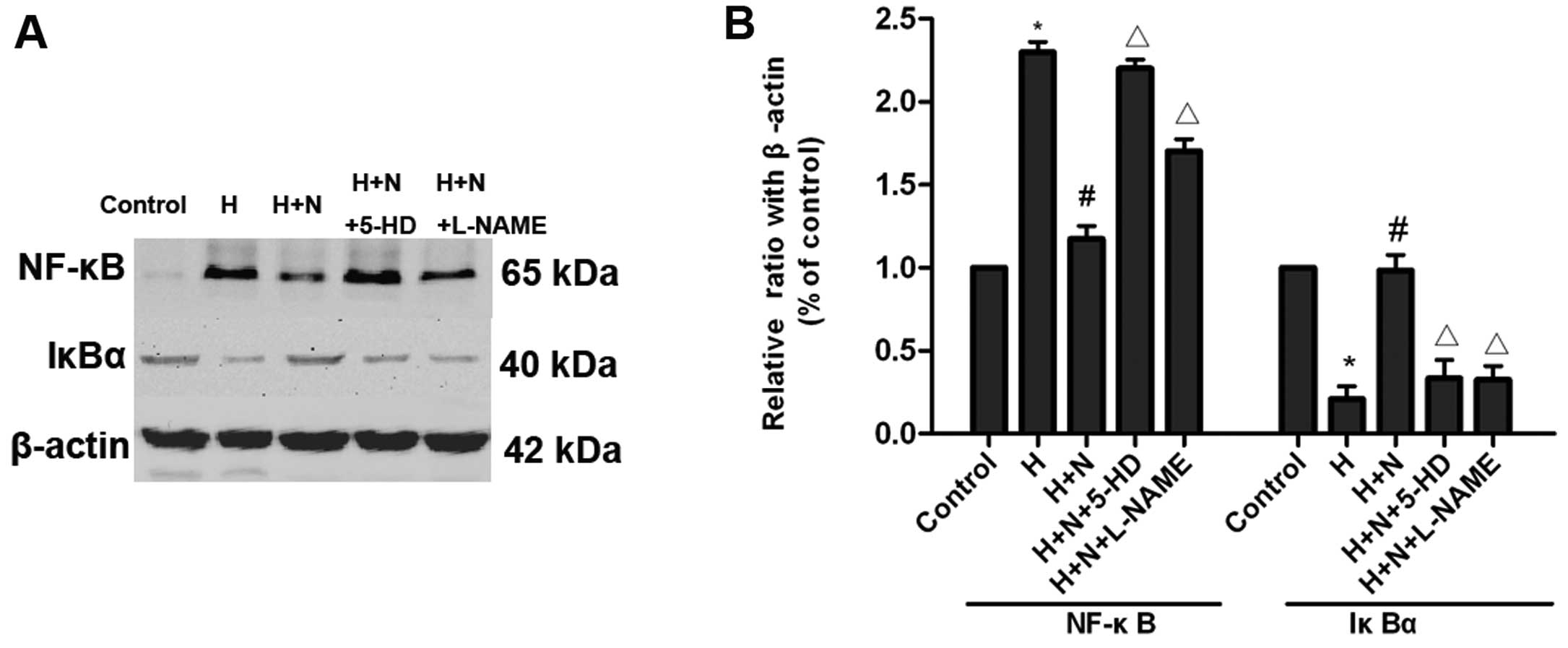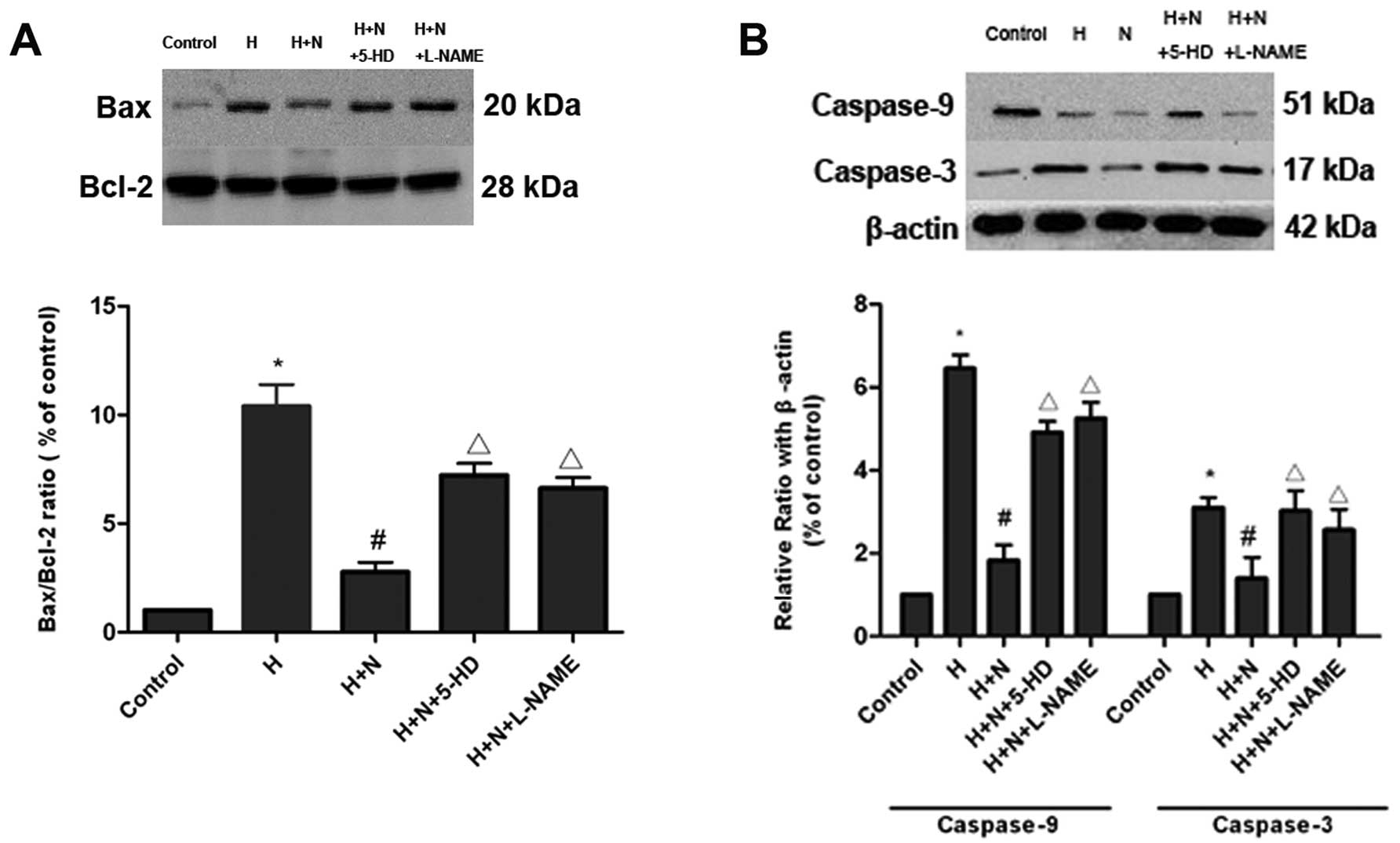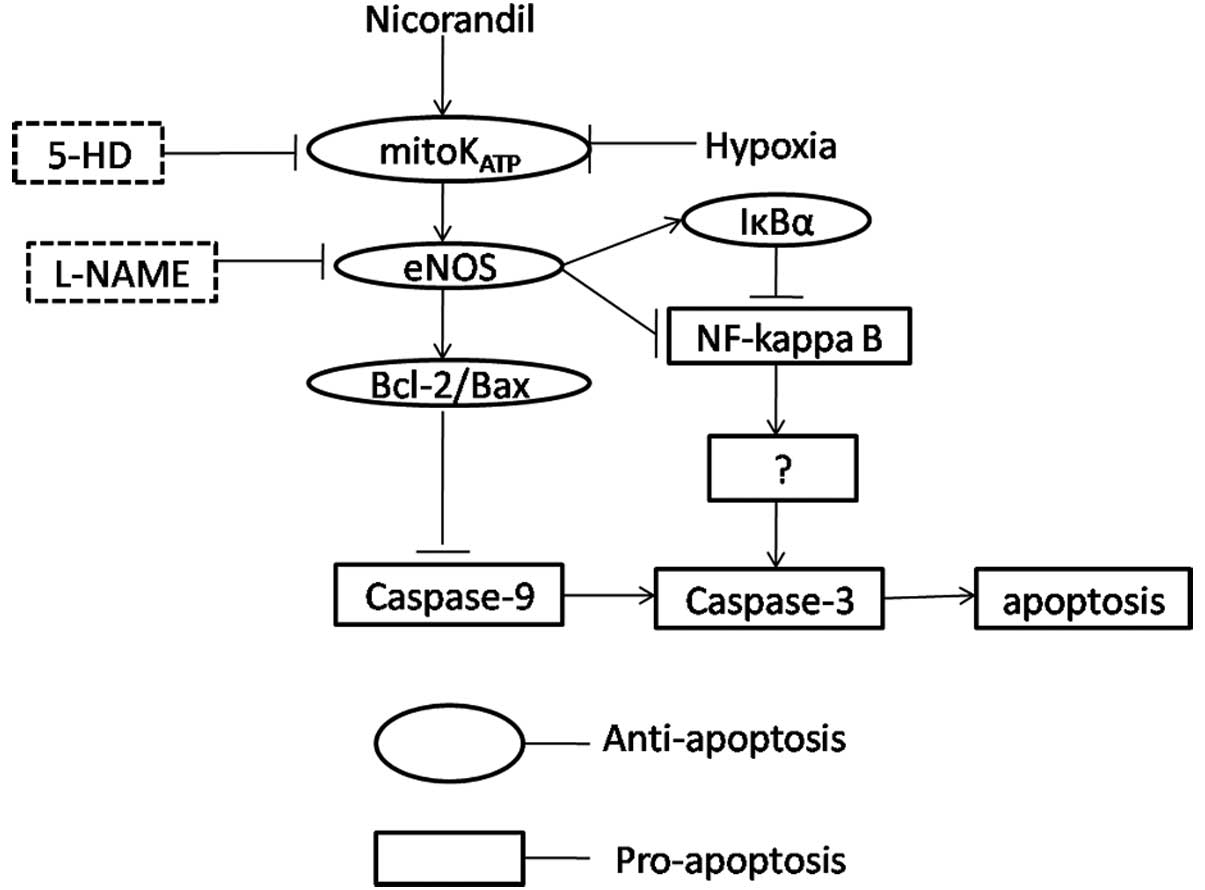|
1.
|
Simonneau G, Robbins IM, Beghetti M, et
al: Updated clinical classification of pulmonary hypertension. J Am
Coll Cardiol. 54(Suppl 1): S43–S54. 2009. View Article : Google Scholar : PubMed/NCBI
|
|
2.
|
Jurasz P, Courtman D, Babaie S and Stewart
DJ: Role of apoptosis in pulmonary hypertension: from experimental
models to clinical trials. Pharmacol Ther. 126:1–8. 2010.
View Article : Google Scholar : PubMed/NCBI
|
|
3.
|
Sakao S, Taraseviciene-Stewart L, Wood K,
Cool CD and Voelkel NF: Apoptosis of pulmonary microvascular
endothelial cells stimulates vascular smooth muscle cell growth. Am
J Physiol Lung Cell Mol Physiol. 291:L362–L368. 2006. View Article : Google Scholar : PubMed/NCBI
|
|
4.
|
Taraseviciene-Stewart L, Kasahara Y, Alger
L, et al: Inhibition of the VEGF receptor 2 combined with chronic
hypoxia causes cell death-dependent pulmonary endothelial cell
proliferation and severe pulmonary hypertension. FASEB J.
15:427–438. 2001. View Article : Google Scholar
|
|
5.
|
Teichert-Kuliszewska K, Kutryk MJ,
Kuliszewski MA, et al: Bone morphogenetic protein receptor-2
signaling promotes pulmonary arterial endothelial cell survival:
implications for loss-of-function mutations in the pathogenesis of
pulmonary hypertension. Circ Res. 98:209–217. 2006. View Article : Google Scholar
|
|
6.
|
McLaughlin VV and McGoon MD: Pulmonary
arterial hypertension. Circulation. 114:1417–1431. 2006. View Article : Google Scholar : PubMed/NCBI
|
|
7.
|
Nagata K, Obata K, Odashima M, et al:
Nicorandil inhibits oxidative stress-induced apoptosis in cardiac
myocytes through activation of mitochondrial ATP-sensitive
potassium channels and a nitrate-like effect. J Mol Cell Cardiol.
35:1505–1512. 2003. View Article : Google Scholar
|
|
8.
|
Date T, Taniguchi I, Inada K, et al:
Nicorandil inhibits serum starvation-induced apoptosis in vascular
endothelial cells. J Cardiovasc Pharmacol. 46:721–726. 2005.
View Article : Google Scholar : PubMed/NCBI
|
|
9.
|
Teshima Y, Akao M, Baumgartner WA and
Marban E: Nicorandil prevents oxidative stress-induced apoptosis in
neurons by activating mitochondrial ATP-sensitive potassium
channels. Brain Res. 990:45–50. 2003. View Article : Google Scholar : PubMed/NCBI
|
|
10.
|
Akao M, Teshima Y and Marban E:
Antiapoptotic effect of nicorandil mediated by mitochondrial
atp-sensitive potassium channels in cultured cardiac myocytes. J Am
Coll Cardiol. 40:803–810. 2002. View Article : Google Scholar : PubMed/NCBI
|
|
11.
|
Nishikawa S, Tatsumi T, Shiraishi J, et
al: Nicorandil regulates Bcl-2 family proteins and protects cardiac
myocytes against hypoxia-induced apoptosis. J Mol Cell Cardiol.
40:510–519. 2006. View Article : Google Scholar : PubMed/NCBI
|
|
12.
|
Zuo XR, Wang Q, Cao Q, et al: Nicorandil
prevents right ventricular remodeling by inhibiting apoptosis and
lowering pressure overload in rats with pulmonary arterial
hypertension. PloS One. 7:e444852012. View Article : Google Scholar
|
|
13.
|
Giaid A and Saleh D: Reduced expression of
endothelial nitric oxide synthase in the lungs of patients with
pulmonary hypertension. N Engl J Med. 333:214–221. 1995. View Article : Google Scholar : PubMed/NCBI
|
|
14.
|
Hongo M, Mawatari E, Sakai A, et al:
Effects of nicorandil on monocrotaline-induced pulmonary arterial
hypertension in rats. J Cardiovasc Pharmacol. 46:452–458. 2005.
View Article : Google Scholar : PubMed/NCBI
|
|
15.
|
Horinaka S, Kobayashi N, Higashi T, Hara
K, Hara S and Matsuoka H: Nicorandil enhances cardiac endothelial
nitric oxide synthase expression via activation of adenosine
triphosphate-sensitive K channel in rat. J Cardiovasc Pharmacol.
38:200–210. 2001. View Article : Google Scholar
|
|
16.
|
Grossini E, Molinari C, Caimmi PP, Uberti
F and Vacca G: Levosimendan induces NO production through p38 MAPK,
ERK and Akt in porcine coronary endothelial cells: role for
mitochondrial K(ATP) channel. Br J Pharmacol. 156:250–261. 2009.
View Article : Google Scholar : PubMed/NCBI
|
|
17.
|
Roth S, Dreixler JC, Shaikh AR, Lee KH and
Bindokas V: Mitochondrial potassium ATP channels and retinal
ischemic preconditioning. Invest Ophthalmol Vis Sci. 47:2114–2124.
2006. View Article : Google Scholar : PubMed/NCBI
|
|
18.
|
Ghosh S and Karin M: Missing pieces in the
NF-kappaB puzzle. Cell. 109(Suppl): S81–S96. 2002. View Article : Google Scholar : PubMed/NCBI
|
|
19.
|
Kimura S, Egashira K, Chen L, et al:
Nanoparticle-mediated delivery of nuclear factor kappaB decoy into
lungs ameliorates monocrotaline-induced pulmonary arterial
hypertension. Hypertension. 53:877–883. 2009. View Article : Google Scholar
|
|
20.
|
Ortiz LA, Champion HC, Lasky JA, et al:
Enalapril protects mice from pulmonary hypertension by inhibiting
TNF-mediated activation of NF-kappaB and AP-1. Am J Physiol Lung
Cell Mol Physiol. 282:L1209–1221. 2002. View Article : Google Scholar : PubMed/NCBI
|
|
21.
|
Sawada H, Mitani Y, Maruyama J, et al: A
nuclear factor-kappaB inhibitor pyrrolidine dithiocarbamate
ameliorates pulmonary hypertension in rats. Chest. 132:1265–1274.
2007. View Article : Google Scholar : PubMed/NCBI
|
|
22.
|
Kawamura T, Kadosaki M, Nara N, Wei J,
Endo S and Inada K: Nicorandil attenuates NF-kappaB activation,
adhesion molecule expression, and cytokine production in patients
with coronary artery bypass surgery. Shock. 24:103–108. 2005.
View Article : Google Scholar : PubMed/NCBI
|
|
23.
|
Revermann M, Schloss M, Mieth A, et al:
Levosimendan attenuates pulmonary vascular remodeling. Intensive
Care Med. 37:1368–1377. 2011. View Article : Google Scholar : PubMed/NCBI
|
|
24.
|
Smith RS Jr, Agata J, Xia CF, Chao L and
Chao J: Human endothelial nitric oxide synthase gene delivery
protects against cardiac remodeling and reduces oxidative stress
after myocardial infarction. Life Sci. 76:2457–2471. 2005.
View Article : Google Scholar
|
|
25.
|
Wright CJ, Agboke F, Chen F, La P, Yang G
and Dennery PA: NO inhibits hyperoxia-induced NF-κB activation in
neonatal pulmonary microvascular endothelial cells. Pediatr Res.
68:484–489. 2010.
|
|
26.
|
Blais V and Rivest S: Inhibitory action of
nitric oxide on circulating tumor necrosis factor-induced NF-kappaB
activity and COX-2 transcription in the endothelium of the brain
capillaries. J Neuropathol Exp Neurol. 60:893–905. 2001.
|
|
27.
|
Ho FM, Lin WW, Chen BC, et al: High
glucose-induced apoptosis in human vascular endothelial cells is
mediated through NF-kappaB and c-Jun NH2-terminal kinase
pathway and prevented by PI3K/ Akt/eNOS pathway. Cell Signal.
18:391–399. 2006. View Article : Google Scholar : PubMed/NCBI
|
|
28.
|
Kwan CY, Zhang WB, Deyama T and Nishibe S:
Endothelium-dependent vascular relaxation induced by Eucommia
ulmoides Oliv. bark extract is mediated by NO and EDHF in small
vessels. Naunyn Schmiedebergs Arch Pharmacol. 369:206–211.
2004.PubMed/NCBI
|
|
29.
|
Takemoto M, Sun J, Hiroki J, Shimokawa H
and Liao JK: Rho-kinase mediates hypoxia-induced downregulation of
endothelial nitric oxide synthase. Circulation. 106:57–62. 2002.
View Article : Google Scholar : PubMed/NCBI
|
|
30.
|
Steudel W, Scherrer-Crosbie M, Bloch KD,
et al: Sustained pulmonary hypertension and right ventricular
hypertrophy after chronic hypoxia in mice with congenital
deficiency of nitric oxide synthase 3. J Clin Invest.
101:2468–2477. 1998. View Article : Google Scholar : PubMed/NCBI
|
|
31.
|
Fineman JR, Wong J, Morin FC III, Wild LM
and Soifer SJ: Chronic nitric oxide inhibition in utero produces
persistent pulmonary hypertension in newborn lambs. J Clin Invest.
93:2675–2683. 1994. View Article : Google Scholar : PubMed/NCBI
|
|
32.
|
Matsushita H, Morishita R, Nata T, et al:
Hypoxia-induced endothelial apoptosis through nuclear factor-kappaB
(NF-kappaB)-mediated bcl-2 suppression: in vivo evidence of the
importance of NF-kappaB in endothelial cell regulation. Circ Res.
86:974–981. 2000. View Article : Google Scholar : PubMed/NCBI
|
|
33.
|
Chen G, Chen Y, Chen H, et al: The effect
of NF-kappaB pathway on proliferation and apoptosis of human
umbilical vein endothelial cells induced by intermittent high
glucose. Mol Cell Biochem. 347:127–133. 2011. View Article : Google Scholar : PubMed/NCBI
|
|
34.
|
Huang J, Kaminski PM, Edwards JG, et al:
Pyrrolidine dithiocarbamate restores endothelial cell membrane
integrity and attenuates monocrotaline-induced pulmonary artery
hypertension. Am J Physiol Lung Cell Mol Physiol. 294:L1250–L1259.
2008. View Article : Google Scholar
|
|
35.
|
Greco R, Mangione AS, Amantea D, Bagetta
G, Nappi G and Tassorelli C: IkappaB-alpha expression following
transient focal cerebral ischemia is modulated by nitric oxide.
Brain Res. 1372:145–151. 2011. View Article : Google Scholar
|
|
36.
|
Samavati L, Monick MM, Sanlioglu S,
Buettner GR, Oberley LW and Hunninghake GW: Mitochondrial K(ATP)
channel openers activate the ERK kinase by an oxidant-dependent
mechanism. Am J Physiol Cell Physiol. 283:C273–C281. 2002.
View Article : Google Scholar : PubMed/NCBI
|
|
37.
|
Harada N, Miura T, Dairaku Y, et al: NO
donor-activated PKC-delta plays a pivotal role in ischemic
myocardial protection through accelerated opening of mitochondrial
K-ATP channels. J Cardiovasc Pharmacol. 44:35–41. 2004. View Article : Google Scholar
|
















